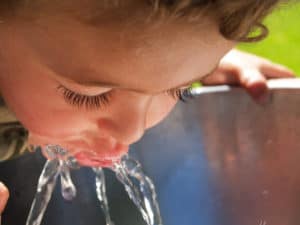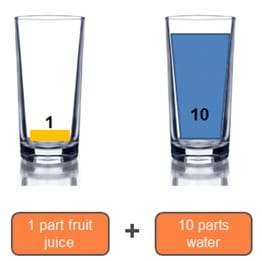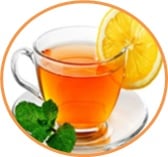If you’re anything like us, we enjoy the longer evenings and relish the chance to get outside for some fresh air and fit in some exercise. During the warmer weather it’s important to drink plenty of fluids, as we’re more at risk of dehydration. In this blog we will discuss top hydration tips and also explore healthy drinks.
Why is water important?
Water makes up more than two-thirds of the human body. It’s important to stay well hydrated as water plays a vital role in a number of bodily functions, including lubricating our joints and eyes, aiding digestion, helping to flush out waste and toxins, and in keeping our skin healthy. If we don’t drink enough, we become dehydrated as our bodies lose more fluid than we take in through eating and drinking. When the normal water content of our bodies is reduced, it upsets the balance of minerals in our body, which can affect the way it functions. Our bodies can be affected even when we lose a small amount of fluid.
Dehydration
Two early signs of dehydration include feeling thirsty and having dark coloured urine. This is the body’s way of trying to increase water intake and decrease water loss.
According to NHS Choices, some of the other early warning signs of dehydration include:
- feeling thirsty and lightheaded
- a dry mouth
- tiredness
- passing urine less often than usual
We tend to loose more water through sweat when the weather is very hot, meaning we are at greater risk of dehydration. To prevent this from happening, we should try to increase our fluid intake across the day. We all sweat and loose water at different rates, meaning there are no specific recommendations about how much fluid we should each drink. The Eatwell Guide (PDF, 7.7MB) does suggest however that we drink regularly and have around 6-8 cups of water a day and drink more in warmer weather and when exercising. Ensure children have plenty of opportunity across the day to have a drink and make water freely accessible at all times and always offer a drink with meals and snacks.
Which drinks are best?
‘Fluid’ includes not only water (tap and bottled) but also other drinks such as milk, fruit juice, tea, coffee, and soft drinks. We also get around 20% of our fluid intake from the food we eat. When choosing drinks for yourself or for children remember that, while they may provide water, drinks such as fruit juice and soft drinks, also provide calories and sugars. These calories can contribute to our energy intake in the same way that foods do and sugary drinks can also damage our teeth and contribute to tooth erosion. The best drinks for us are therefore milk and water.
Not all bottle water is suitable for children. The mineral content of some are unsuitable for children so always check the label for suitability. Avoid buying fizzy or flavoured water as these can increase the risk of tooth decay. Bottled water is an unnecessary expense as, contrary to popular belief, the UK has some of the highest quality tap water in the world!

Top tips for increasing water consumption
- Have a water cooler in the office so staff can easily access water
- Provide water at meetings e.g. have jugs of water on the table
- Carry a water bottle with you to ensure you can continue to drink throughout the day whatever you’re doing
- Give children a water bottle to take with them to school
- Have a water area in your nursery where children can help themselves to water. Encourage them to pour the water themselves into a suitable cup or beaker
Fruit Juice
Fruit juice and smoothies also count towards our fluid intake, although they are a source of free sugars, which can damage teeth. We shouldn’t drink more than a combined total of 150ml per day. We get more nutrients when we eat a piece of fruit compared to when we squeeze the juice from it. If giving fruit juice to children under 5, ensure it is well diluted with water- 1 part fruit juice to 10 parts water. Ensure it is only ever given with a meal and in an open top cup or free flow beaker to help protect children’s teeth. For children over 5, dilute fruit juice 50/50 with water.

Soft drinks
Soft drinks including juice drinks, fizzy drinks and diluted squash (diet, non-diet and no added sugar)
While these drinks can be enjoyed occasionally, opt for water and milk as much as possible. These drinks often contain a large number of calories, a lot of added sugar and very few nutrients. A 330ml can of cola, contains around 35g of sugar, that’s 7 teaspoons! Sugar free and diet soft drinks can also damage our teeth as the added artificial sweeteners make the drink very acidic.
Soft drinks such as juice drinks, squash and fizzy drinks are not recommended for children. Artificial sweeteners taste very sweet and encourage children’s preference for sweeter drinks. Children who drink them frequently may feel too full to eat well at mealtimes.
Tea and coffee
Tea and coffee can also contribute to your water intake. These drinks do contain caffeine however, which can make the body produce urine more quickly. Tea and coffee is safe for adults to drink in moderate amounts. Anyone adding sugar or syrup to their tea or coffee should be cautious of the damage that could have on their teeth. Many people who choose to cut out sugar from their hot drinks soon become accustomed to the taste. Tea and coffee are not recommended for young children.

Sports drinks
Sports drinks can be useful if you participate in high-level endurance sports. However, they are no different from any other sugary soft drinks, which means they are high in calories and contribute to tooth decay. Unless you’re taking part in high-level endurance sports, water is the healthier choice and the best way to replace fluids lost through exercise.
For more information on healthy drinks for children, book our Food and Nutrition for Toddlers Training! (opens in new tab)
